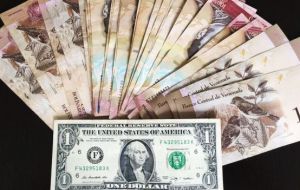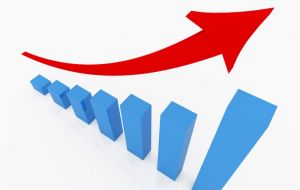MercoPress. South Atlantic News Agency
Triple digit inflation in Venezuela: US dollar trades at 10.387 Bolivar; minimum wage 97.531 Bolivar
 The monthly minimum wage in Venezuela is 97,531 Bolivars, or not even US$1 per day on the parallel exchange rate, making it the lowest in Latin America
The monthly minimum wage in Venezuela is 97,531 Bolivars, or not even US$1 per day on the parallel exchange rate, making it the lowest in Latin America  Maduro has dispatched inspectors to try to contain the price hikes with fines, but that strategy has been largely ineffective in the midst of an economic crisis
Maduro has dispatched inspectors to try to contain the price hikes with fines, but that strategy has been largely ineffective in the midst of an economic crisis  The opposition-controlled parliament said that inflation in the first seven months of the year was 248.6%.
The opposition-controlled parliament said that inflation in the first seven months of the year was 248.6%. The extreme volatility of Venezuela's exchange rate has the crisis-hit country's shop owners hurriedly marking up their merchandise and consumers balking at the higher price tags. Just last week, the Bolivar currency fell around 70% on the black market, according to DolarToday, the opaque U.S.-based website that dictates the black market rate.
Although the currency roared back this week to around 10,387 Bolivars to the U.S. dollar, prices for often imported products have already been adjusted, heaping more hardship on Venezuelans who often earn only a handful of dollars per month.
The monthly minimum wage in Venezuela is 97,531 Bolivars, or not even US$1 per day on the parallel exchange rate, making it the lowest in Latin America despite President Nicolas Maduro's frequent increases. To that is added a 153,000-Bolivar food ticket.
His unpopular populist government has dispatched inspectors to try to contain the price hikes with fines, but that strategy has been largely ineffective in the midst of an economic crisis with triple-digit inflation, recession, and food and medicine shortages.
The opposition-controlled parliament said Wednesday that inflation in the first seven months of the year was 248.6%. The Central Bank has not published official figures for almost two years, when numbers began to worsen.
Many Venezuelans are horrified at the weakening Bolivar, which has lost well over 99% of its value in the last three years. Social media users promoted the hashtag #worktoeat this week.
Maduro blames an “economic war” waged by U.S.-backed coup plotters seeking to bring him down. He has threatened to jail “speculators” who raise prices.
Critics say decade-old currency controls and excessive money printing contribute to inflation and a weakening exchange rate. But with the government increasingly short of dollars to supply the currency control system, more imports are obtained using the black market rate.
In the first half of the year, about 25% of all imports were made by private companies using the black market, according to local consultancy Ecoanalitica. That means Venezuelan prices are even more sensitive to changes on the black market.




Top Comments
Disclaimer & comment rules-

-

-

Read all commentsREF: “Venezuela - oil assets”:
Aug 11th, 2017 - 09:15 pm +1https://www.reuters.com/article/us-venezuela-russia-oil-specialreport-idUSKBN1AR14U
China could have played the same game.
Not a surprise, really, Venezuelan “money” is worth less than World of Warcraft Currency...
Aug 10th, 2017 - 06:37 pm 0http://fortune.com/2017/08/01/venezuela-bolivar-world-of-warcraft-currency/
As we wait with bated breath for the country to become a sort of World of Warcraft scenario.
Aug 10th, 2017 - 06:45 pm 0Commenting for this story is now closed.
If you have a Facebook account, become a fan and comment on our Facebook Page!